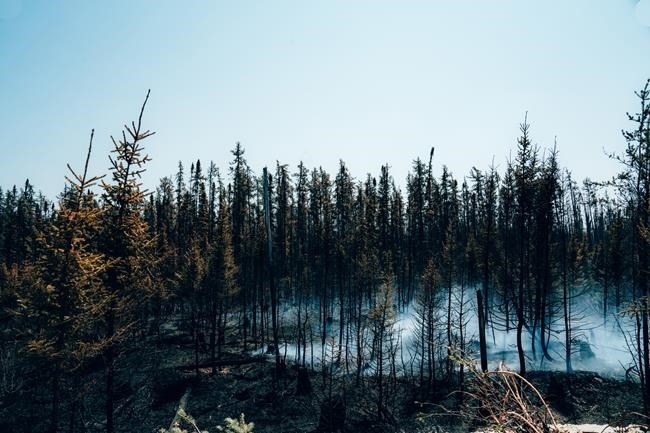MONTREAL — Wildfires in northwestern Quebec prompted thousands to evacuate the area over the weekend, as the number of blazes across the province pushed past 150 and firefighters and the military poured into a pair of regions to fight the encroaching flames — even as that threat eased slightly Sunday on the North Shore.
Some 5,500 residents of the Abitibi-Témiscamingue region, which borders Ontario, have been relocated, Public Security Minister François Bonnardel said at a news conference in Montreal.
Another 4,500 people in the North Shore community of Sept-Îles and its outskirts were also forced from their homes due to two wildfires burning north of the city, but no further evacuations are planned at the moment, Bonnardel said.
Rain is expected in the area in the coming days — though not as much as initially forecasted — and the wind direction there and in Abitibi are favourable, he added.
Nonetheless, the state of emergency in Sept-Îles, which sits about 890 kilometres northeast of Montreal, has been extended for five days, with evacuation orders in place at least through Monday morning. Some 100 soldiers were set to arrive Sunday evening to lend a hand, hot on the heels of the 100 who landed in the city Saturday.
The number of forest fires in the province notched up to 156 Sunday from 134 the day before, including 35 actively being fought by teams from Quebec forest fire prevention organization SOPFEU.
"We concentrate our battles on these fires because we want to protect human life, the houses and enterprises. And we want to protect our infrastructure, like Hydro-Québec's," Bonnardel said at the news conference held alongside other public officials at provincial police headquarters.
Hundreds of soldierswill deploy across Quebec, joining roughly 500 firefighters under SOPFEU's banner, he said.
“Within a few days, there should be more than 1,000 people on the ground to fight these fires,” Bonnardel said. The additional manpower will allow crews to go on the offensive and reduce the blazes, rather than simply defending homes and critical infrastructure, he added.
A further 100 firefighters from France are en route to shore up the effort, President Emmanuel Macron said in a Twitter post Sunday afternoon. "Canadian friends, reinforcements are coming," he wrote in French.
In the meantime, residents are barred from entering vast swaths of forests across multiple regions, including in Northern Quebec, Abitibi-Témiscamingue, Saguenay–Lac-Saint-Jean, the North Shore, Outaouais, Mauricie, Lanaudière and the Laurentians.
"We are facing a situation that has never been seen," said Natural Resources and Forests Minister Maïté Blanchette Vézina at the news conference in Montreal.
On Saturday evening, the municipality of Val-d'Or announced the mandatory evacuation of several areas sparked by two wildfires and poor air quality. Located within Abitibi-Témiscamingue, the community is under a state of emergency.
No blazes are currently threatening the city of Val-d'Or itself, SOPFEU said Sunday. Between 6 p.m. on Saturday and 9 a.m. Sunday, public health officials had recommended staying home with the windows closed due to the smoky haze engulfing the area.
Meanwhile more than 750 residents of the small town of Normétal, 200 kilometres northwest of Val d'Or, also fell under an evacuation order Sunday and relocated to a pair of towns further south.
About 2,000 residents of Lebel-sur-Quévillon, about 620 kilometres northwest of Montreal, had received a mandatory evacuation notice on Friday evening due to nearby blazes. The thick smoke initially prevented planes from flying in the area Sunday morning before it cleared somewhat.
At a news conference in Sept-Îles, Mayor Steeve Beaupré said caution is key.
"The fire situation is evolving encouragingly, but it remains out of control and threatening for the municipality," he said.
"The situation may not have gotten worse, but it has to get better ... We made the decision to go gradually and watch the evolution for the next 24 hours."
Things shift with the weather, warned SOPFEU spokeswoman Isabelle Gariépy.
“As long as it is not contained, the state of a fire can change depending on where we are with the temperature," she said.
Roughly 14,000 Quebecers have been forced from their homes in recent days, including in Sept-Îles and the neighbouring Innu community of Mani-Utenam.
While speaking with CBC’s Rosemary Barton, federal Public Safety Minister Bill Blair said over the weekend Canada is experiencing a fire season earlier than normal and spanning multiple regions of the country simultaneously — from Alberta to Nova Scotia — making for "interesting and unique challenges" around resources.
This report by The Canadian Press was first published June 4, 2023.
Christopher Reynolds and Coralie Laplante, The Canadian Press



